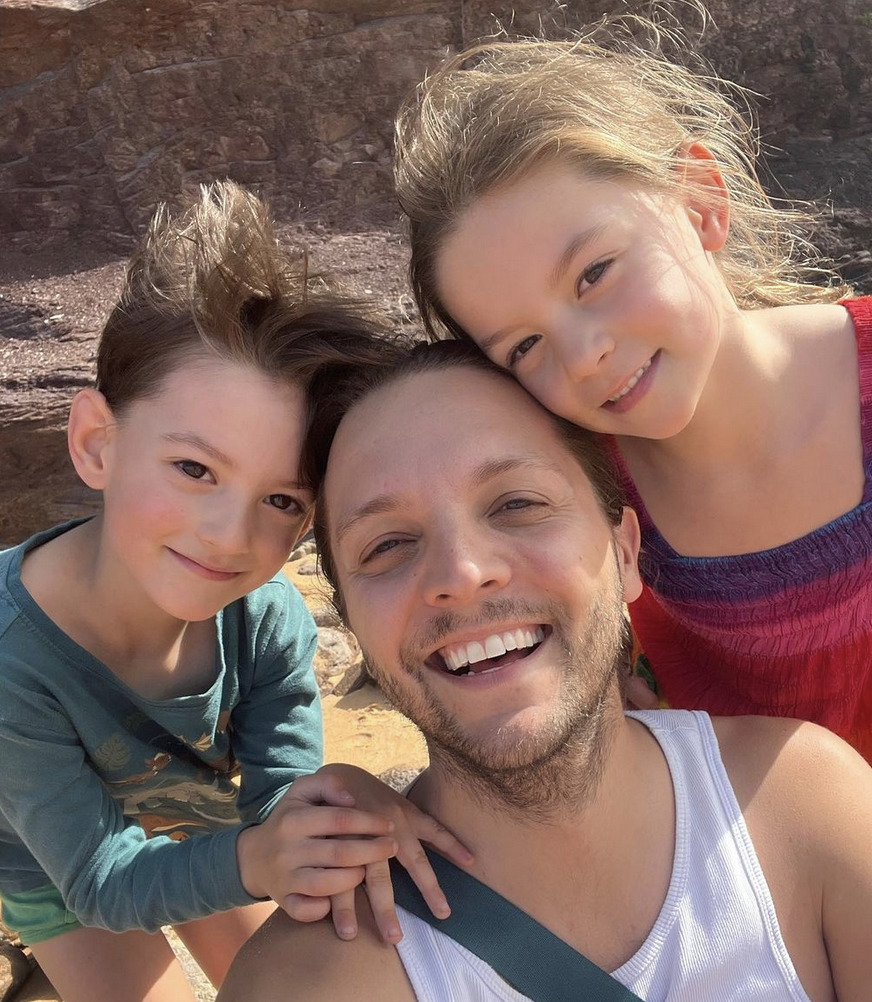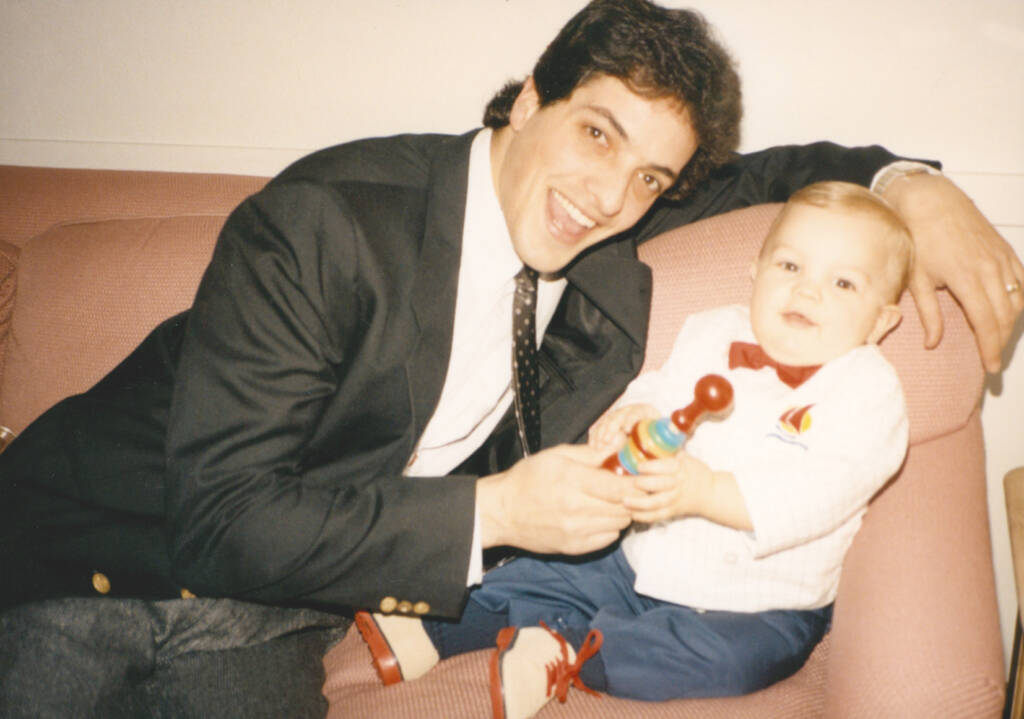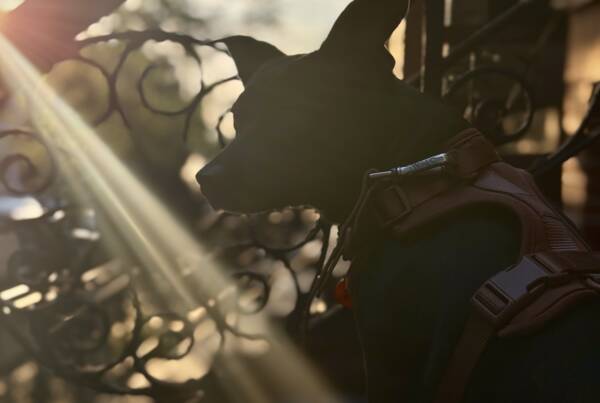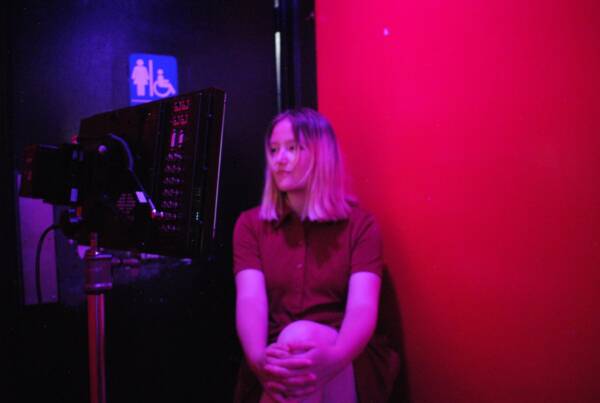Interview of Sean Szeps by Freya Bennett
Sean Szeps wonderful book Not Like Other Dads was released in June of this year and is an anthem to reinventing the rules of parenting and families. Heartwarming, tender and always hilarious, Sean Szeps is candid with his experience of being a full-time dad of twins.
You can read an excerpt we published of Not Like Other Dads here and below, to celebrate Father’s Day, our chat with Sean.
Hey Sean, firstly, congrats on your book, I really loved hearing your story. How’re you feeling after its release?
The process of writing your most intimate stories down is such a cathartic, therapeutic journey. But when it’s completed and goes to print, the stories are no longer yours. They belong to the readers now, which can feel quite daunting. The truth is, the response has been beautiful. Connecting with readers each and every week via email or DMs has been wildly rewarding, especially when fellow parents have finished a chapter and are left feeling less alone than when they started it. These private conversations have become the best part of the process, communicating with people and realising the power of your turth. That your honesty has the ability to shape someone’s perspective. It’s definitely left me inspired to write and share more, which is a long-winded way of saying, “Great. I’m feeling great after its release.”
Haha! I’m so happy you’re feeling great! I love the sentiment of ‘…the stories are no longer yours’ – what a generous gift to your reader!
After becoming the full time parent to your twins, you found yourself experiencing post natal depression, something not really talked about in men, how did you come to find out this is what you were suffering?
I knew what post natal depression was prior to having children, having read about it in the media, but I was under the impression that it was something only happening to mothers. So when I started to exhibit symptoms of depression a few months after the birth of our twins, I kept very quiet about it.
Besides thinking “this feeling can’t be PND”, I also felt like I didn’t have a good enough reason to complain. I hadn’t carried my children or given birth to them. I wasn’t breastfeeding the twins, so why would I be justified in feeling the way I felt? Additionally, there were so many people – mostly conservative – who thought I shouldn’t have been allowed to get married, let alone have children in the first place. I didn’t want them to win, so I decided to lie and pretend I was totally fine.
Sadly, I wasn’t. One night, seven or so months into parenting, I had a very scary experience. I left the house in the middle of the night and drove myself to the airport in an attempt to flee the country and my parenting responsibilities. It woke me up to the severity of the issue at hand. The next morning, I spoke to my husband and he booked me a GP appointment. It was during that appointment that I was given the Edinburgh Postnatal Depression Scale test and after scoring quite high, it was suggested that I see a psychologist and a psychiatrist.
Later, with the support of this new team, I was diagnosed with PND and later began taking Zoloft to bring old Sean back.
What would you like your story to achieve when we think about men’s mental health, particularly in relation to having kids?
Things are getting better year after year, but we still live in a society where most men take a “she’ll be right” approach to their mental health. I’m generalising here, but when I talk to my friends about their male partners, I often hear the same types of things: “They don’t talk about their emotions. I have to pull it out of them. They don’t talk to their mates about how they’re really feeling”.
The truth is, men struggle with the transition to fatherhood, too. When you pair a completely justified societal focus on the mother after birth with a “she’ll be right” mental health approach for men, we’re left with fathers who don’t speak up about their emotional well-being after becoming parents.
Sure, this fails the men. Of course it does. 1 in 10 men will struggle with PND and the risks can be devastating. But it fails their partners and children, too. When we feel we can’t be honest with our loved ones about our mental health because we believe we aren’t “allowed” to struggle, then we suffer in silence. Or suffer in not-so-silence, nasty ways that impact those around us. The ramifications of emotional suppression are well documented and I hope my story assists in further documentation of this massive issue.
Depression doesn’t see gender. It doesn’t go easy on you just because you’re a bloke. My story is just one example of just how dangerous it can be to believe otherwise.
Where can men or those in their lives, find support for postnatal depression?
It all starts at home, I really believe that. The first and safest place is usually with our partners, immediate family members and with our closest friends. We have to ensure, before having children, that we have a strong village around us that we can trust. This is imperative to surviving the first few years of parenthood. Maybe even the entire damn journey.
While it will sound annoying to many women to read this – adding another thing to their already very full plate – I think the best and most reliable support option for many men struggling with postnatal depression is their wife. If the stereotypes are true (and it often seems that way), most modern fathers were still raised by men who weren’t very comfortable sharing their feelings. This left the newest generation of men – some of them – without the necessary skills to open up and share when they are struggling, let alone the belief that asking for help isn’t something to be embarrassed about.
If you notice the signs of depression in your partner (or friend or family member) start the conversation in the safety of their home. Ask simple questions, share your own experience to encourage them to share theirs and let them know what you have observed. Then, suggest that they visit their GP and/or see a therapist. My story is proof that the system can work, you just have to be willing to raise your hand and ask for help.
If you know a man who is struggling, consider connecting them with organisations that have dedicated resources for men like The Gidget Foundation, Panda, Beyond Blue, Support for FathersandThe Fathers Network.
You talk about always wanting to be a mum, what does mothering mean to you?
It’s true. Some of my earliest memories were of wanting to be a mom. Specifically, wanting to emulate my mother in all her kindness and care. I believed, even at the ripe young age of four, that the role of mother – holding everything together and raising the kids – was a role that I would prefer to that of a dad. It was a role I wanted desperately to take on.
Now, I’m not a woman and for that reason I don’t call myself a mother. But I often call myself (after the great Maggie Dent described me this way) a father who is mothering. Here’s why.
Mother and father are both nouns. When we use those words, we mean a woman or a man in relation to their child. But “mothering” and “fathering” are verbs, states-of-being. When we use the term “mothering” in our most modern vernacular, we’re assigning adjectives to the verb such as caring and patience. In fact, we often go a step further. To be “mothering” is to take ownership of the child’s well-being. To be kind, emphatic and thoughtful. Fathering, though used a lot less often in everyday communication, is a totally different state-of-being. It’s often linked to words like tough and strict. We think of an authority figure, don’t we? Someone who provides financially for their family with less involvement in the day-to-day lives of their children.
I am a man who is a parent, a father. But I take on the role that society sees as a mother in our same-sex parenting partnership. I am a father who is mothering my children. And I believe many people – including grandparents, friends and teachers – can take on the mothering role, too. It’s a state-of-being not necessarily linked to gender.
How has your view on parenting evolved as your children grow?
My love for my children hasn’t changed a single bit, but my belief in my importance certainly has.
In the very beginning, I thought I was much more important than I actually was. Like a god-level teacher. I was consumed by doing the things right to ensure they would thrive, desperate to make sure they were getting the “right” inputs to ensure they made the “right” decision. The older they got, the more I realised that they basically came into this world fully formed. They have their own unique personalities that I can’t change, their own special set of skills and therefore their own unique path that feels, at times, predetermined.
They aren’t the helpless blank slates that I imagined (and let’s be honest, society sometimes projects) them to be before they were born. Sure, they need us. Of course they do. We teach them incredibly important things and help them develop and refine their character and values. That shouldn’t go unnoticed. But the older they get, the more I come to terms with the fact that it’s not actually my job to teach them everything, so much as to guide and support them as they experience it all. It feels strange to admit, because I consider myself very involved in their day-to-day lives, but the older they (and I) get, the more comfortable I become with stepping back and enjoying their ride, supporting them as they experience it all.
Finally, what would be one piece of advice you’d give to first time parents?
Ask for and accept the help that’s offered to you. Most first-time parents become strangely, as if it’s beyond their control, obsessed with doing everything their own way. They want special alone time with no influence from family, they are reluctant to follow the advice of their well-intended mother or mother-in-law, and they purposefully develop parenting strategies in hopes of course-correcting the “mistakes” their parents made. When help is offered, they think of it as a sign of weakness to accept it. An endless series of “thanks, but I’m doing fine” when in reality it’s all a bit much.
The truth is, we all need help. Lots and lots of it. We need a village to thrive and accepting help is like a muscle; the more we do it, the better we get at it. The more help we accept, the more likely we are to provide it. The more we provide it, the stronger our villages become. And the stronger our villages become, the easier parenting is. I really believe it’s as simple as that.








